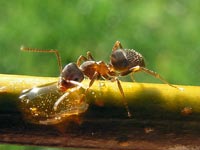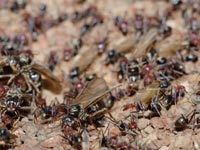This article is reposted from the old Wordpress incarnation of Not Exactly Rocket Science.
Imagine you get a bad cold, but you decide to put on a brave face and go into work anyway. Instead of jokingly covering their mouths and making jibes about staying away from you, your colleagues act perfectly normally and some even and start rubbing up against you. It's a weird scenario, but not if you were an ant.
 With their large colonies and intense co-operation, ants are some of the most successful animals on the planet. But like all social insects and animals, their large group sizes make them vulnerable breeding grounds for parasites and infections. A infectious disease in a tightly knit colony spells trouble and it's no surprise that social insects have evolved ways of stopping the spread of infections.
With their large colonies and intense co-operation, ants are some of the most successful animals on the planet. But like all social insects and animals, their large group sizes make them vulnerable breeding grounds for parasites and infections. A infectious disease in a tightly knit colony spells trouble and it's no surprise that social insects have evolved ways of stopping the spread of infections.
Some are sticklers for hygiene and meticulously clean their peers while others quarantine infected individuals in colony sick chambers. Some termites even warn their peers to stay away through head-banging. And bees kill off a heat-resistant bacteria by gathering in an infected part of the colony and raising its temperature, effectively setting off a 'colony fever'.
Now, scientists from the University of Copenhagen have found that some ants use a form of collective immunity, where infected individuals trigger resistance in those around them through contact.
Line Ugelvig and Sylvia Cremer looked at how ants deal with infections by setting up groups of garden ants (Lasius neglectus) including five workers and three larvae in a separate chamber. They then introduced a sixth adult that was either healthy, dusted with live fungal spores, or dusted with inert spores whose DNA had been wrecked by ultraviolet radiation bombardment and could no longer infect.
The infected newcomers spent about half as much time in the brood chamber than the non-infected ones, presumably to avoid spreading the spores to the young. The existing workers also noticed the presence of live spores and cared for the larvae more intensely than normal.
 This change in behaviour didn't actually depend on the health of the new ant, as all the parties concerned reacted accordingly before the spores had a chance to germinate. And amazingly, the ants seems to be able to sense the presence of spores, and they can even tell the difference between those that can infect and those that can't.
This change in behaviour didn't actually depend on the health of the new ant, as all the parties concerned reacted accordingly before the spores had a chance to germinate. And amazingly, the ants seems to be able to sense the presence of spores, and they can even tell the difference between those that can infect and those that can't.
Even though the ants can detect live spores, the five workers spent as much time in contact with the sixth ant in all situations, infected or not. That seems strange - surely it would benefit the adults to avoid infection just as it would the larvae?
To see if rubbing up against an infected peer had any benefit, Ugelvig and Cremer applied the fungus spores to all of the adults in the group after five days. They saw that ants with no previous experience with the spores were about 50-70% more likely to die than those which had made contact with an infected newcomer.
Ugelvig and Cremer believe that the ants are using a sort of social immunity, where an infected individual passes on a form of protection to its nestmates. Another study in 2005 showed that termites may also use the same trick. They were more likely to develop a strong immune response to a fungus if they were kept in groups than in solitary confinement.
Social immunity could work in two ways. The spore-ridden ant could pass the spores themselves onto others, triggering immune responses in the rest of the group, or it could pass on immune chemicals, like antibodies.
Whatever the case, it's a powerful strategy for protecting the health of the colony. If a parasite enters the colony, contact-based immunity would rapidly create a ring of resistant individuals around the infected one, shielding the rest of the colony from the spread of disease.
Reference: Ugelvig & Cremer. 2007. Social prophylaxis: group interaction promotes collective immunity in ant colonies. Curr Biol 17: 1-5.
- Log in to post comments




did you mean to say bees raise the temp to kill heat-sensitive bacteria in paragraph three? Also one/two typos in paragraph two. They-> They're; and it sounds cool when you says ants are one of the most successful animals on the plant, cause the study is on garden ants, but I think you meant to say planet. -I got your back and thoroughly enjoy all your articles
Its a shame humans don't possess the ability to directly confer a resistance. I would go around kissing all the cute sick girls during flu season. Also I noted that the experiment was done with fungus, any report of similar behavior with viruses or bacteria?
oh snap I made a typo now in post 1, I meant ->their not ->they're... I've been studying all night and day, midterms are upon me. So nobody harass me for my english skills.
Chris has just demonstrated the phenomenon where if you correct someone on grammar or spelling, you yourself will cock up your grammar or spelling in an ironic way.
I believe this is known as Muphry's Law ;-)